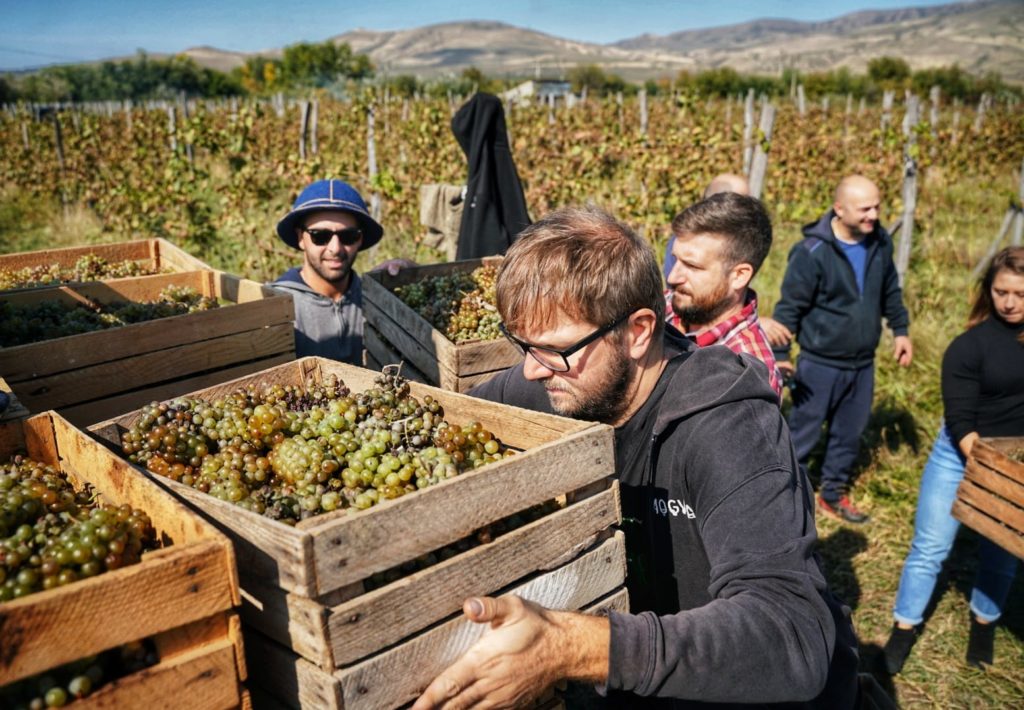What is Rtveli Georgia (Wine Harvest): Simulation vs Real Rtveli (original) (raw)
Rtveli in Georgia is an annual tradition. A wine harvest festival that is more than just drinking wine – it is the process of picking the grapes, processing them into juice, and starting the fermentation process to make wine. Couple this with a supra (feast) to celebrate a job well done, and you have for a pretty epic and important event.
Rtveli is not a single festival in one place, it is held by families throughout Georgia (country), all through grape harvest season (Late August to early November). For visitors to Georgia, there are options to attend a Real Family Rtveli or to participate in simulations of the types of activities that will take place during Rtveli.
In this article, I explore the traditions of Rtveli, as well as discuss the various options to participate and outline the common elements that make up a Real Family Rtveli. You’ll also learn which weeks/months the Rtveli typically occurs in each of the main wine regions of Georgia.
- What is Rtveli? Georgia’s Wine Harvest Festival
- When Does Rtveli Happen?
- Simulation Harvest Experiences vs Real Rtveli
- Wine Harvest – The Full Artisan Experience
- Experience Rtveli. Take a Tour With Us.
Love consuming your information in podcast form? Listen to our Rtveli Georgia episode on the Tbilisi Podcast:
What is Rtveli? Georgia’s Wine Harvest Festival
Rtveli (Georgian: რთველი) is Georgia’s wine harvest festival. It encompasses the whole process, from picking the grapes, through processing them into the wine vessels (qvevri) and the supra (feast) that follows a successful harvest.
Rtveli is more than just the celebration at the end of the grape harvest, it’s the whole event. Also, it is not a single regional event, it happens amongst families across the country. Every family that makes their own wine will have a Rtveli of their own. Each can happen in one day, multiple times, or spread over many days, depending on the size of the harvest for each family and the chosen harvest dates.
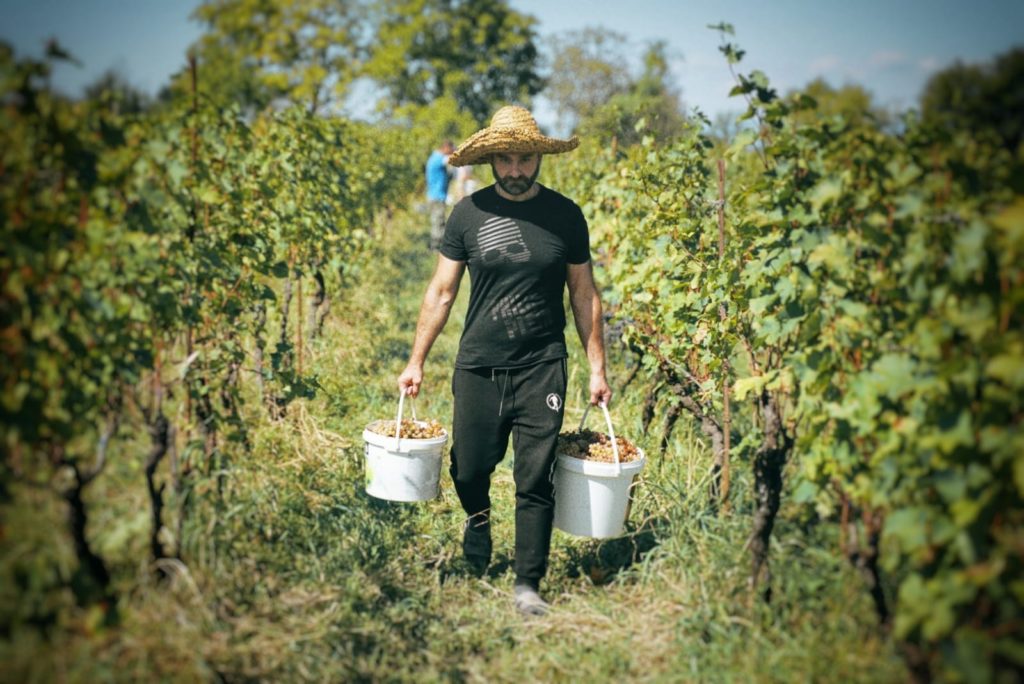
Carrying grapes from the vine by hand at an artisan winery.
The name Rtveli itself is derived from the Georgian “Stveli” meaning “fruit harvest”. The “s” was at some point replaced with the “r” to more specifically refer to the grape harvest.
The tradition of Rtveli in Georgia is an ancient one, even if the name may be a little newer. As Georgians have been making wine for over 8000 years, each part of the festival and the associated songs and processes have evolved over that time. Today, though some modern processes have been incorporated into Georgian winemaking (like using machinery to press the grapes and separate the stems), many of the ancient traditions, like picking grapes by hand and stirring the wine in the qvevri manually, or cleaning the qvevris with natural cherry bark, are still practiced today by many natural wine makers.
Singing Georgian songs, sometimes dancing, cooking mtsvadi (BBQ) in the fields amongst the vines, preparing special dishes like churchkhela (made from grape juice, nuts, and flour), and performing the traditional toasts of the supra, can all be a part of the festivities.
The Rtveli brings families together as children return to their family homes in the country to assist with the harvest. Each family has their own personal way to celebrate. Each winemaker has their own preference on how their wines are made. No family Rtveli is the same, even if they bear many common elements.
Although it is a family led event, welcoming guests (and neighbors) to assist with the harvest is also possible, and through my company Eat This! Tours I have spent years fostering relationships with artisan winemakers, many of whom will welcome our foreign guests to be a part of this wonderful tradition. More below on what to expect.
Roles at Rtveli used to be particularly gender segregated, with men mostly picking the grapes, pressing them, and making the wine. Women preparing various harvest dishes and everything for the supra. But times are changing, and now winemaking as a female profession is growing fast. Our goal with our tours is to visit more progressive wineries where anyone can participate in any of the activities – although the winemaker still gets the final say on exactly how the wine is made, of course!
When Does Rtveli Happen?
The Rtveli happens when the sugar content of the grapes have reached their ideal amount, based on the winemaker’s preference, which varies depending on where in the country they are grown.
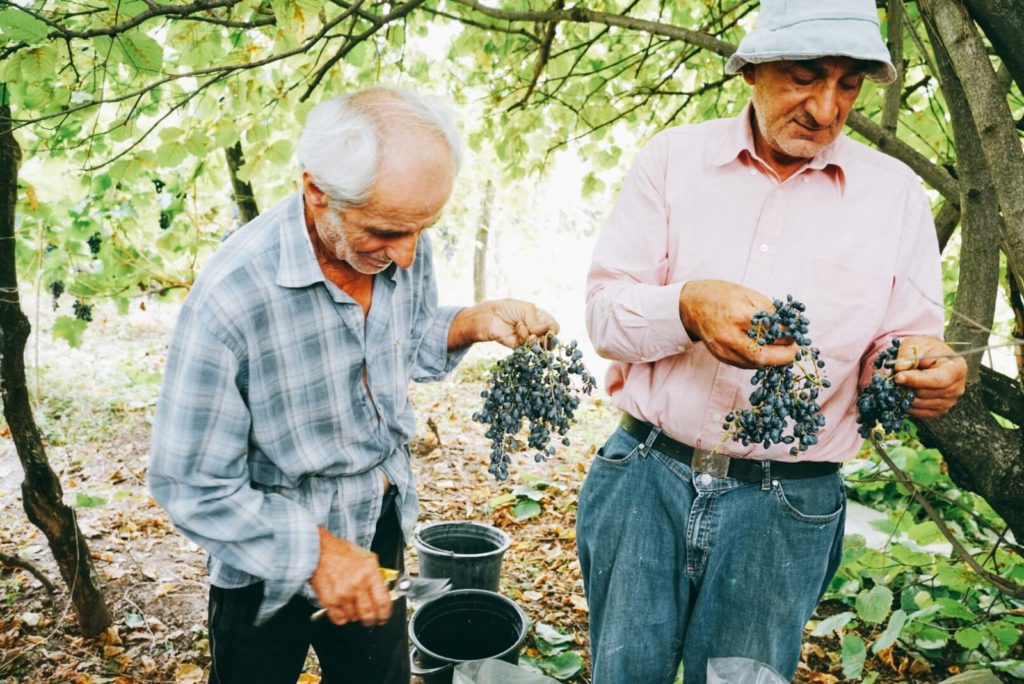
Selecting the best Budeshuri grapes to make the finest artisan wines.
Depending on the season overall, and the weather through the year, some winemaker’s start to harvest as early as mid-August (rarely), with the peak harvest being approximately around September 10th to October 10th, but sometimes all the way into early November, especially in areas like the mountain slopes of Racha in West Georgia.
An early harvest may be because the season has been very hot, or fear of frost or rain damaging the crops. Late harvest, often if the weather has been milder. The exact time of harvest can have a massive effect on the flavor and quality of the wine. Harvesting in wet weather can be problematic for the wine, making the real Rtveli very weather dependent.
Because of these considerations, the decision on the exact date may often be made just a few days before it happens. An approximate date may be agreed in advance, but that can move by a few days, at the last minute, if weather conditions change.
Typical Harvest Dates In Primary Wine Regions
These are when the majority of harvests normally take place. However, there can still be plenty of harvests outside of these typical dates, especially if you opt for a simulation, rather than the real thing.
Kakheti (Telavi/Signagi): Early September to end of September.
Kartli (Gori/Bolnisi etc.): Late September to Mid October
Imereti (Kutaisi): Late September to Mid October
Racha (Ambrolauri): Early/mid October, sometimes to early November
Simulation Harvest Experiences vs Real Rtveli
As a tourist, the best harvest experience depends on your preferences and availability. There are 3 versions that are typically possible, 2 are the common ones that get offered to tourists, and then there is the most authentic and least commonly offered option – The Real Family Rtveli.
Easy Simulation Harvest
Larger wineries that have plenty of grapes offer a simple pay-to-harvest simulation where guests get to carry out a few harvest experiences (typically picking grapes, pressing grapes – sometimes by hand or foot, sometimes with a machine – and some cooking activities like making churchkhela or baking bread).
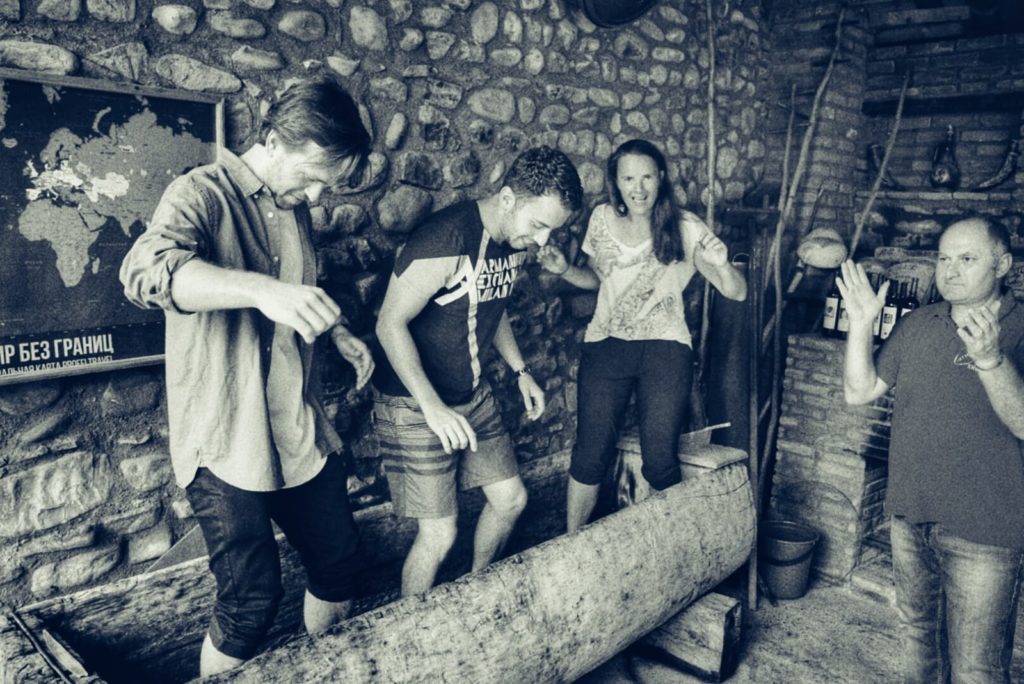
Pressing grapes barefoot at an independent winery
At more commercial locations, this is followed by eating a meal, and tasting some wine. In some independent wineries, where we normally take people, you can sometimes have a supra (feast) and maybe even a tamada (toastmaster) to lead the meal – it depends where you book.
Pros:
- Easy (you don’t have to do much actual work)
- Predictable & normally not weather dependent – so you can book in advance easily
- Available most days or everyday during the season
- Historic activities available, like stomping grapes barefoot, that would not be used to make actual artisan wine (due to hygiene).
Cons:
- Often hosted by staff, not winemakers or families
- It’s significantly less authentic
- The activities can feel artificial, and wine is rarely made from the grapes you pick
The main benefit of this type of wine harvest experience is that you can book well in advance and it’s almost guaranteed to run on the date you book, even if it’s raining. Making it the only option if you have no flexibility with your dates. Though many of the larger wine factories do provide options that feel artificial, we have a few independent wineries where the experience is still super fun, even if not truly authentic.
We offer simulations in September & October and we are connected with independent wineries where you will meet the winemaker and have a small supra.
Tourist / Event Harvest
The tourist / event harvest is when wineries or tour companies put together events for large groups of foreigners (sometimes locals from the cities too) to come and be farm laborers for the day – though normally not as hard work as for locals if they were harvesting by themselves. In essence, a day is chosen, a bus load of foreigners are brought from the city, and traditional harvest activities are lined up, catering for guests’ interests.
These events are often a cheaper, though less authentic way, to experience something that is close to being a real rtveli, and wine may be made from the grapes harvested. But the key difference is that it is a staged event, and it’s a big group of tourists, not locals, performing the harvest.
Pros:
- Fixed dates (though may not be announced more than a couple of weeks in advance)
- Often at a cheaper price per person – though cheap does not always mean better…
- Meet lots of other foreigners
Cons:
- Still lacking authenticity
- Stomping grapes barefoot would rarely happen if they are making actual (good) wine from the grapes
- Impersonal, large group
We rarely run these types of events. When we dothe goal is more about a fun party with activities, professional entertainment etc. than a full authentic harvest. We are also able to run these specifically for large private group bookings (12+ guests). We don’t make our events super cheap, as quality is more important for us. See our full list of harvest tour options here.
Real Family Rtveli Georgia
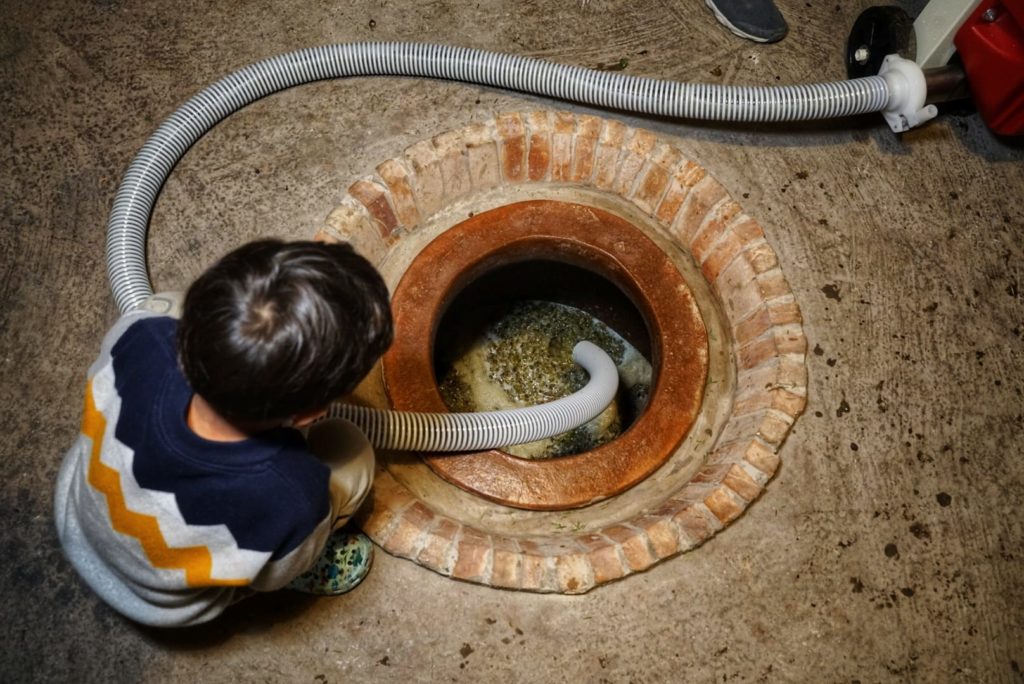
The son of the winemaker helps fill the qvevri with grape juice.
The most authentic possible option by far. Participating in the real family harvest, as a small group, alongside family members and their neighbors and friends. Be a part of the full process, followed by a real family supra, which you can help prepare too.
The full outline of how a real family rtveli occurs, is below this section.
Pros:
- Most authentic by far
- Make real connections with locals
- Be a part of every step of the process
- Actually make wine – that you can come back next year to drink (if they have any left)!
Cons:
- Very weather dependent / unpredictable dates – flexibility essential
- Some waiting around, as things take time when they are real! (but our guides try to keep you entertained at every step)
- Stomping grapes barefoot would rarely happen if they are making actual (good) wine from the grapes.
Most tour companies would never host these types of trips. They are hard to coordinate, and dates move around at the last minute. Many artisan winemakers, simply don’t want tourists getting in the way of the process, especially not large groups.
But for me, this is the real Georgia experience. Every part of it. We only get to run a limited number of these each year due to the complexity of the logistics, but they are without a doubt the best tours we run. Even though they are not for everyone.
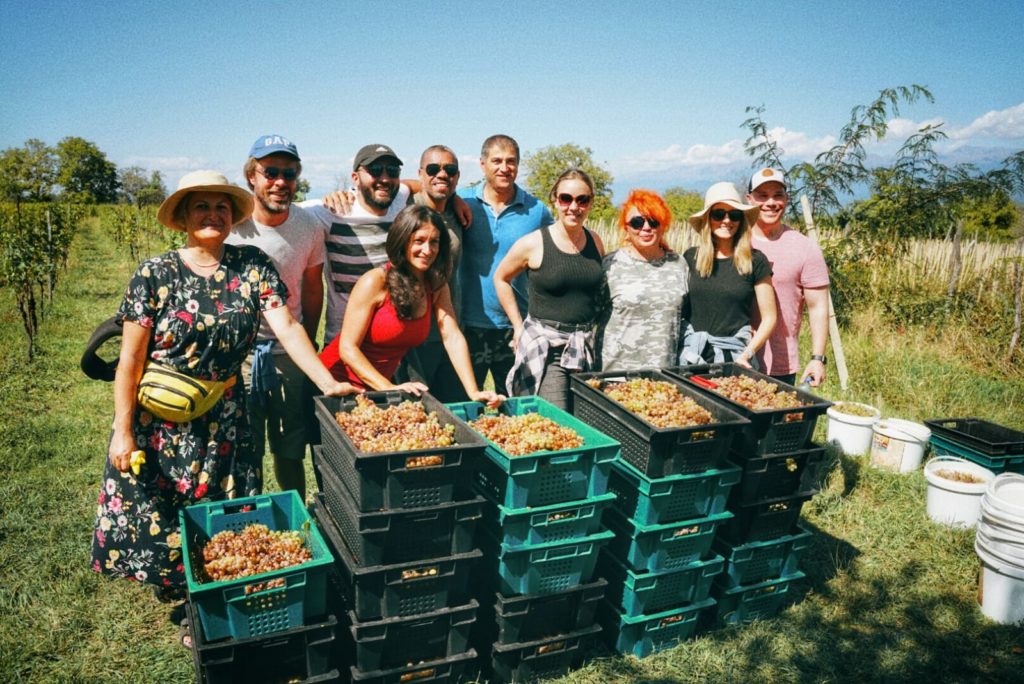
Small group Rtveli in Kakheti with a mix of guests and Georgian friends of the winemaker
For our trips, we don’t have you out in the fields at 7am… Though the family may already have been picking by that time. But you will definitely pick a lot of grapes (~2 hours), so your labor will directly contribute to the wines made that year. It’s not super hard work, but it is work.
Some people don’t want a “real” experience. Because simulation days, while lacking authenticity, do allow for less waiting around or doing actual grape picking, and more just eating and drinking. With simulations, all the key fun activities are packed into 4 hours, in a more controlled environment. Some people prefer to keep it simple, rather than more authentic.
But if authenticity is your priority, our Real Family Rtveli tours are about as close as you can get.
No matter your preference we do have options for everyone.
But if you want to attend the Real Family Rtveli please get your name and date availability on our waitlist as these tours are strictly limited.
For simulation tours, you can pre-book dates here.
For larger group tours, see events we have running here or submit a custom tour request for your group tour here.
Want to know more about the Real Family Rtveli? The main steps of our limited tours are explained below.
Wine Harvest – The Full Artisan Experience (Real Rtveli Georgia)
Understand the main events of Real Family Rtveli, step by step.
It should be noted that every family that hosts our Real Rtveli Tours is unique. We cannot guarantee Georgian singing, but it happens sometimes. We cannot guarantee Georgian dancing, but we have families that do it. What we can guarantee is a one-of-a-kind experience packed with genuinely welcoming people and true authenticity.
So, the below summary highlights the elements of every tour, but the specifics are always down to the exact family you visit.
1. Picking the Grapes
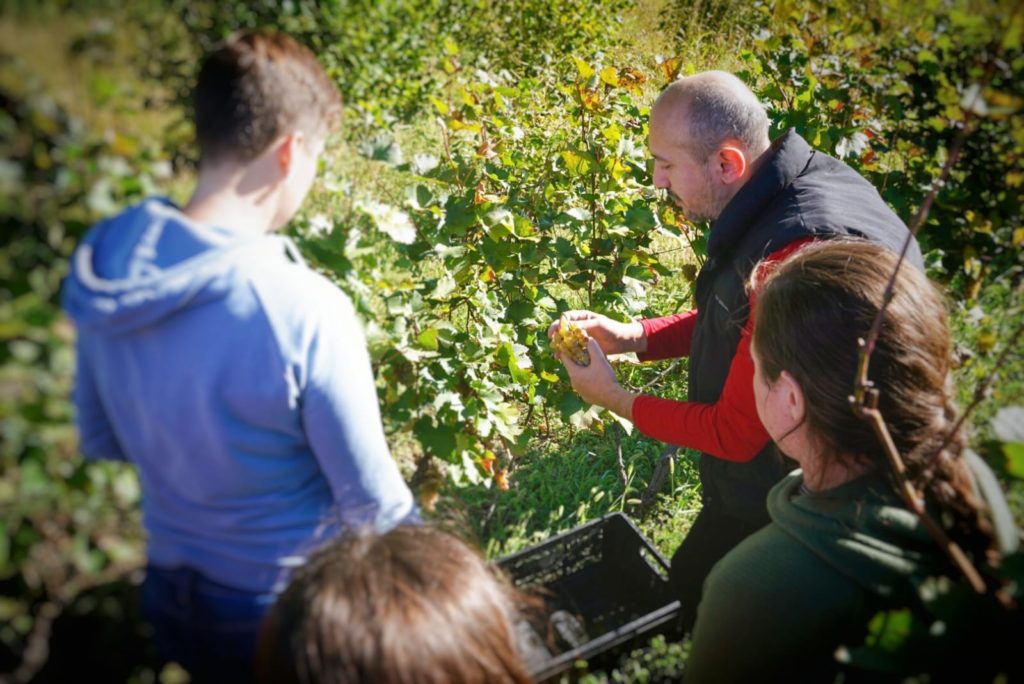
Guests learning from the winemaker the best way to select and pick grapes
On our 2 day tours, we stay overnight near to the vineyard, to give you an easier morning and the option to arrive a little earlier. Depending on the weather, grape picking may finish by midday, or sometimes earlier, as hot grapes cause issues for the winemaker. For this reason, we’ll be in the field by 10am at the latest. For our 1 day tours, this means leaving Tbilisi by 8am in most cases.
For later season harvest, as the weather cools down, picking a little later can also happen.
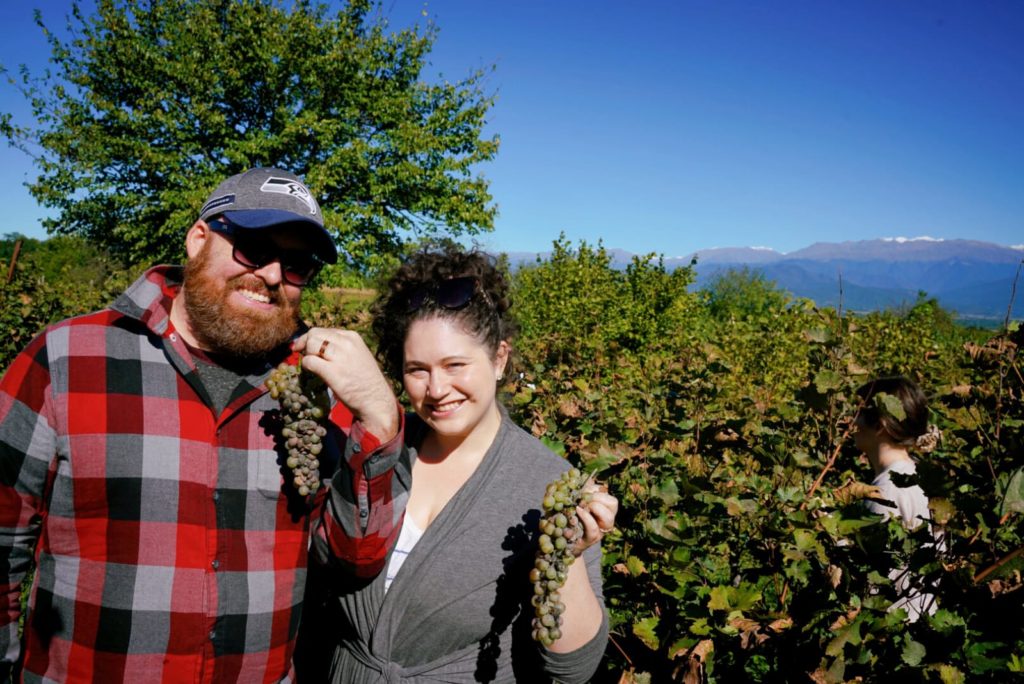
Guests picking grapes opposite the Caucasus Mountains.
Many of our vineyard locations are surrounded by mountains, but not all.
2. Loading the Grapes
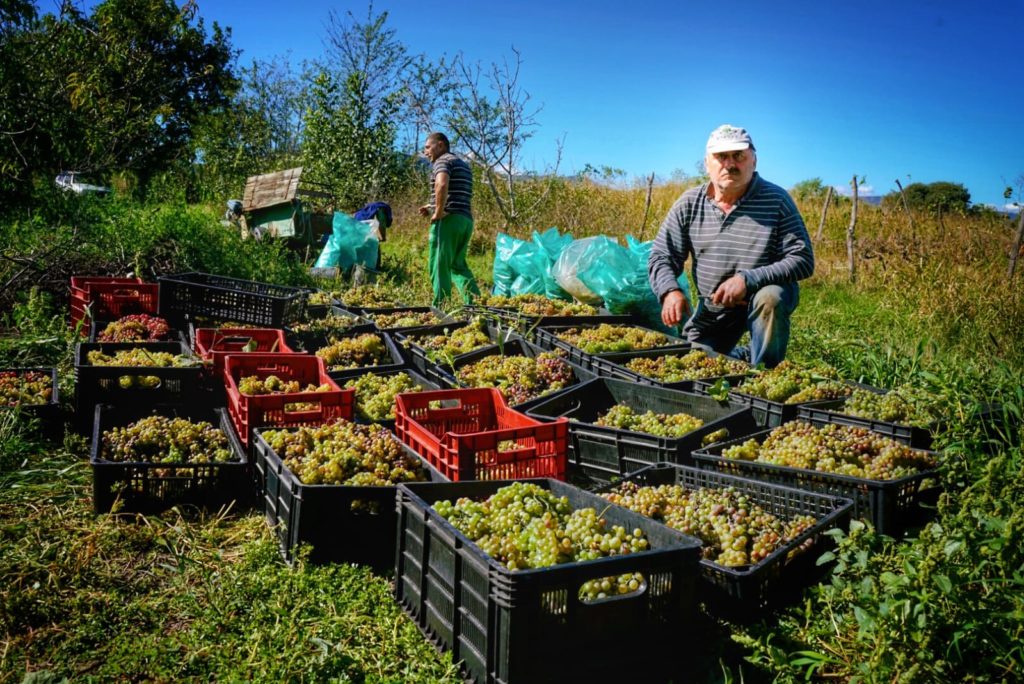
Packing the grapes ready for transportation
To get the grapes back to the marani (wine cellar) where the qvevris are located, we need to get them loaded in trays and packed into a vehicle.
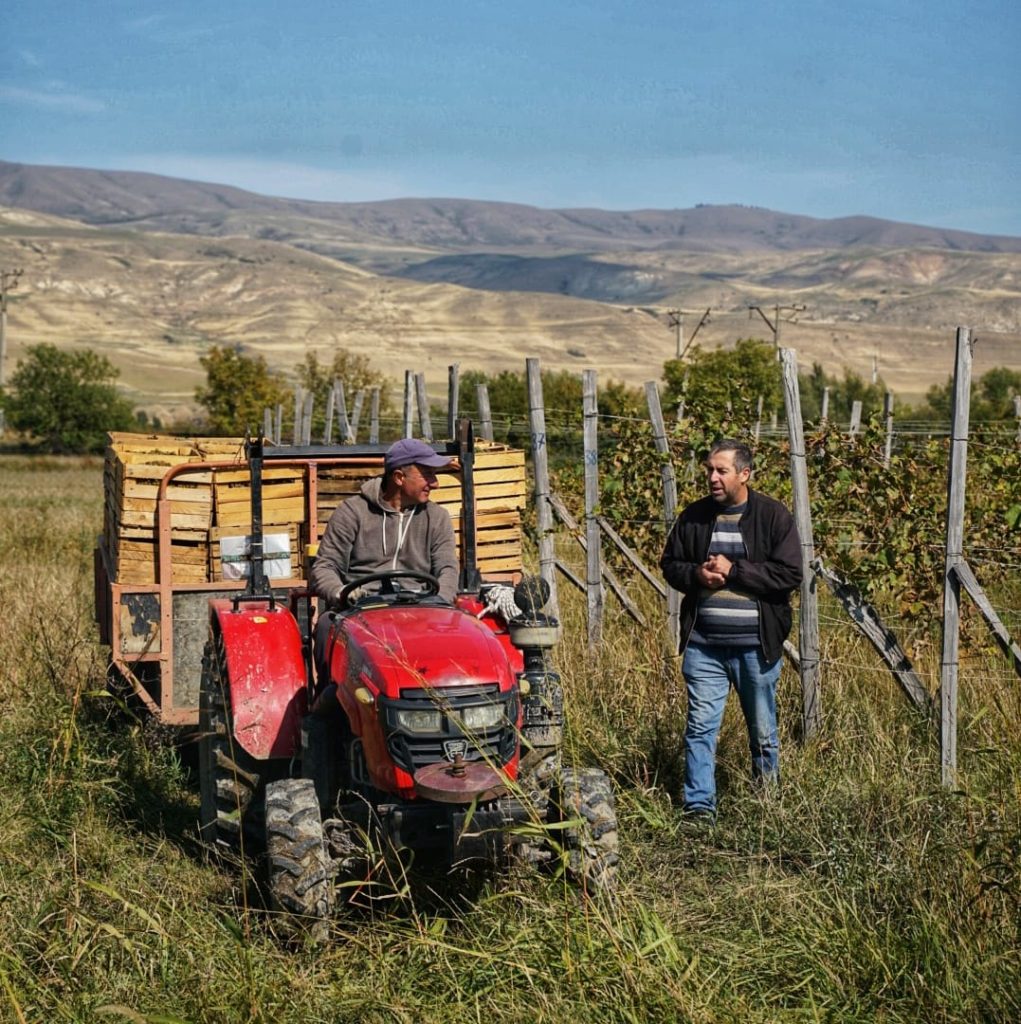
Getting grapes back to the marani (wine cellar).
3. Snacks / Drinks
After a hard morning’s work, you’ll need a break and a snack! This could be anything from heading back to the family home for Khachapuri (cheese stuffed bread) to having a BBQ amongst the vines. A well earned glass of wine may also be in order, or even a shot of chacha (Georgian grappa) for the brave!
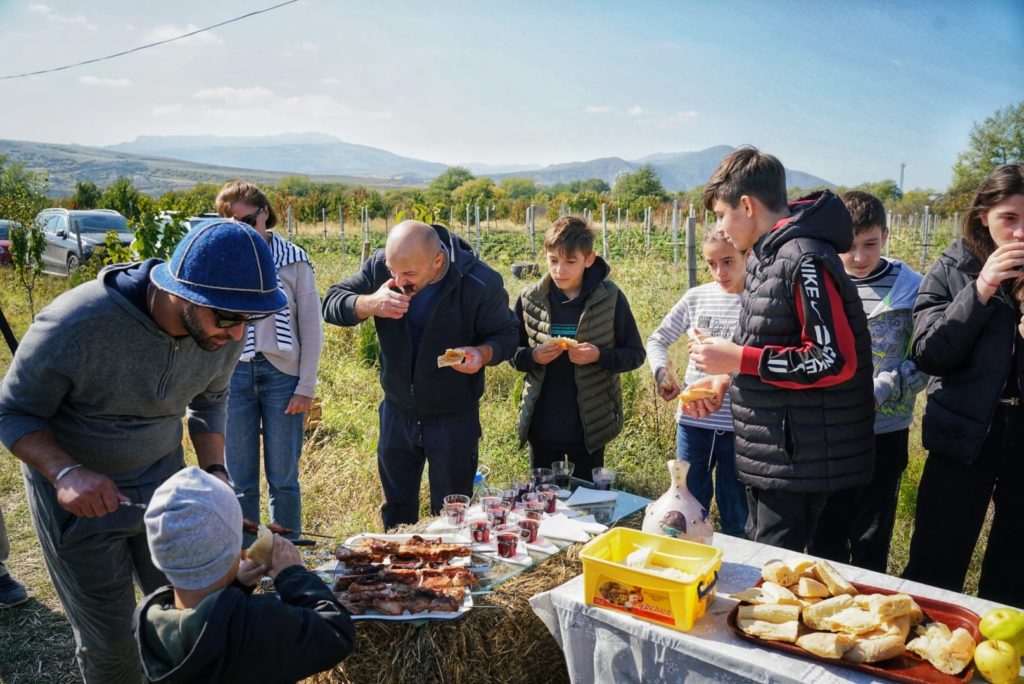
Vine-side picnic & BBQ with the family.
4. Processing the Grapes
The most famous traditional way to crush the grapes is in the satsnikheli. A large wooden vessel, normally carved directly from a whole section of tree trunk, would have people jump in barefoot, singing songs and maybe drinking wine while crushing with their feet.
Because foot hygiene can lead to problems with the wine, plus, because this type of pressing is massively time consuming and labor intensive, very few artisan winemakers use this process anymore, though many will still have a satsnikheli in their marani.
Most will process using a modern electric motor press, which also separates the stems, but leaves the skins and sometimes seeds, as these are an important part of Georgian wine making, even with white (amber) wines.
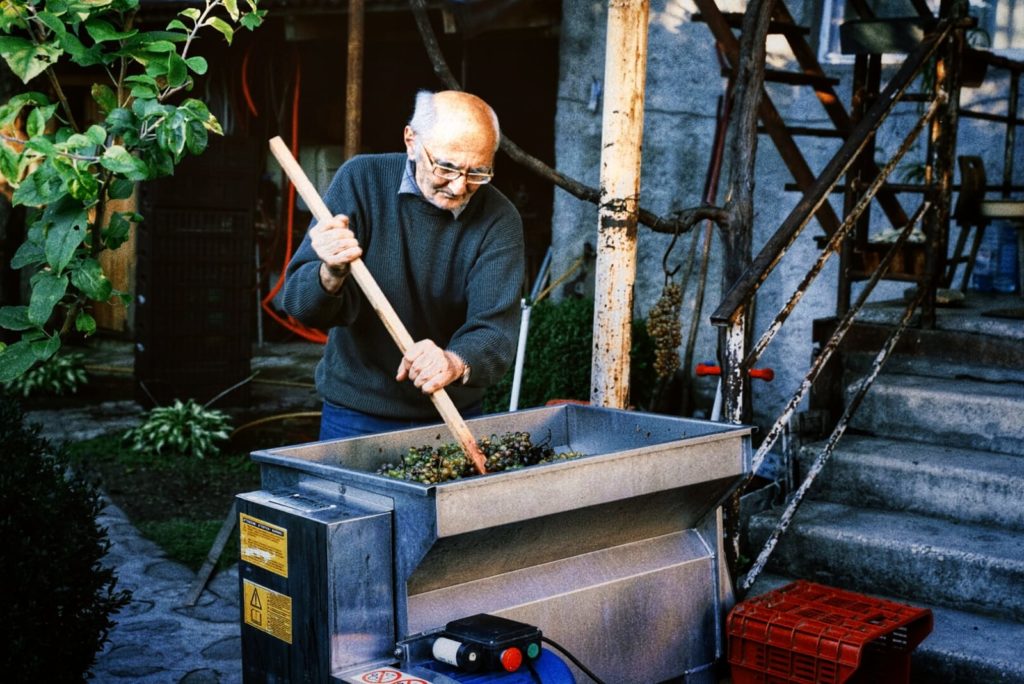
Grape press at family home.
The juice is then automatically pumped to the qvevris via a long tube.
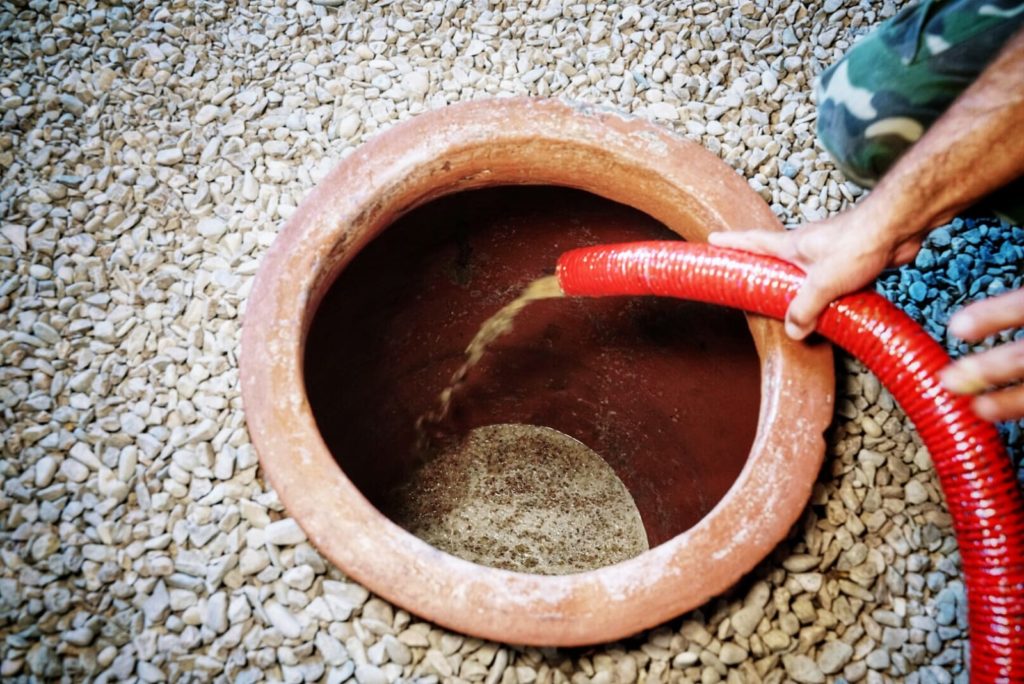
A few winemakers use a satsnikheli and normally have people wear sanitized rubber boots, but this is mainly just to make a small portion of the wine, or for fun. The juice from barefoot crushing may also be used to make churchkhela, as the juice is boiled before the food is made.
5. Preparations for the Supra / Cooking Classes
While the grapes are being processed, which can take 1 hour or more per ton of grapes, guests can help out, or can enjoy a glass of wine and relax, while observing the process, and/or they can help prepare food.
Some of the most common dishes that you can learn to make are khinkali (soup dumplings), khachapuri (cheese bread), deda’s puri (bread baked in the tone oven), mtsvadi (BBQ).
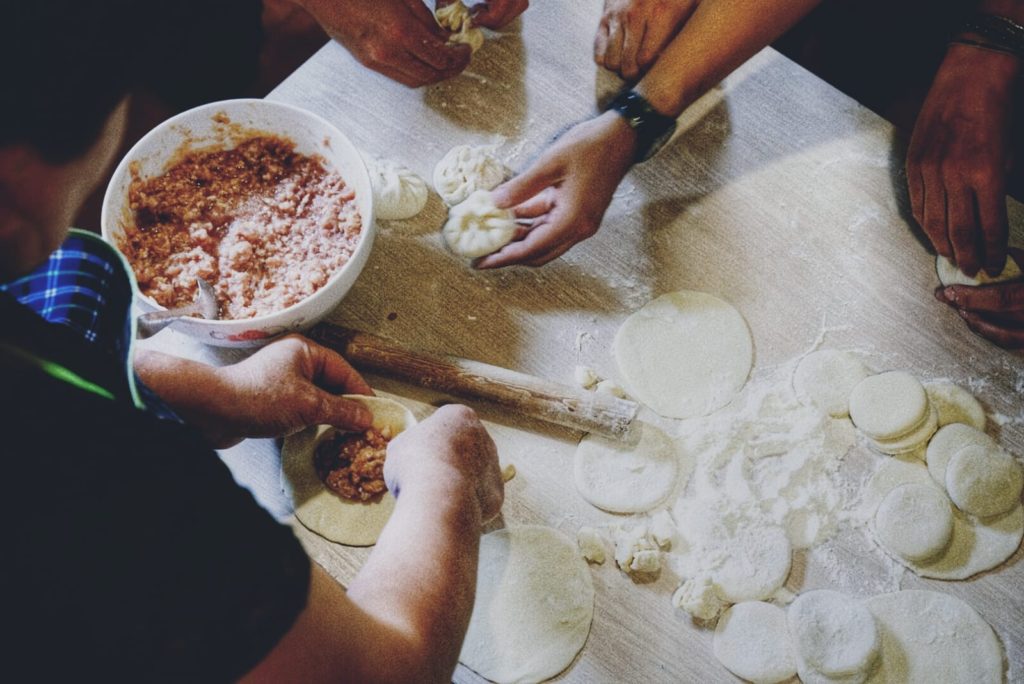
Making khinkali with mother
Every family has their own favorite dishes, so the menu will never be identical, but classic dishes are normally on offer. Some families will provide something extra special, like a whole roasted piglet, lamb, or goat. But this cannot be guaranteed. Vegetarians need not panic though, Georgia has a large variety of vegetarian options – just let us know in advance about your dietary requirements.
6. Make Churchkhela
At some, not all, of our Real Family Rtveli’s, you can learn to make the traditional harvest sweet: churchkhela. Grape juice is boiled and reduced, mixed with flour and made into a thick goo that you can dip nuts in, on a string. The churchkhela is then left to dry. It will not normally be ready to eat at the supra, but you can take yours home.
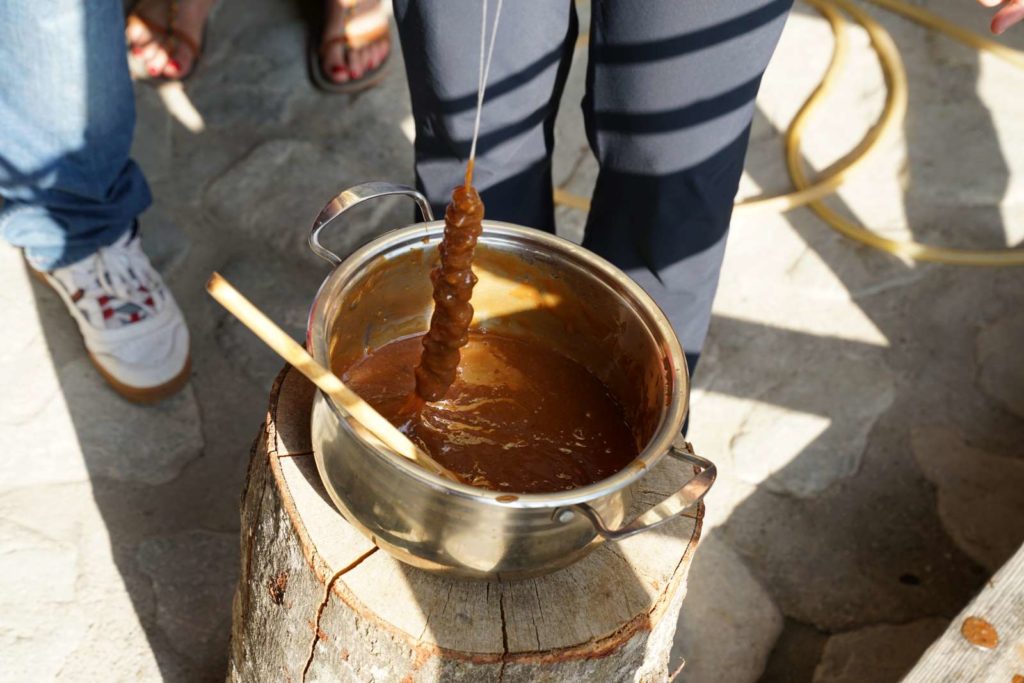
The best thing is that no sugar is added – it’s 100% natural sugar from the grapes, when made in the traditional way at family homes.
Whether juice is leftover to make churchkhela can depend on the yield of grapes, and whether you are at the start of grape harvest season or the end. The winemaker can decide if grapes are destined for the qvevri, or not up to standard and ready to make churchkhela instead.
7. The Supra (Feast)
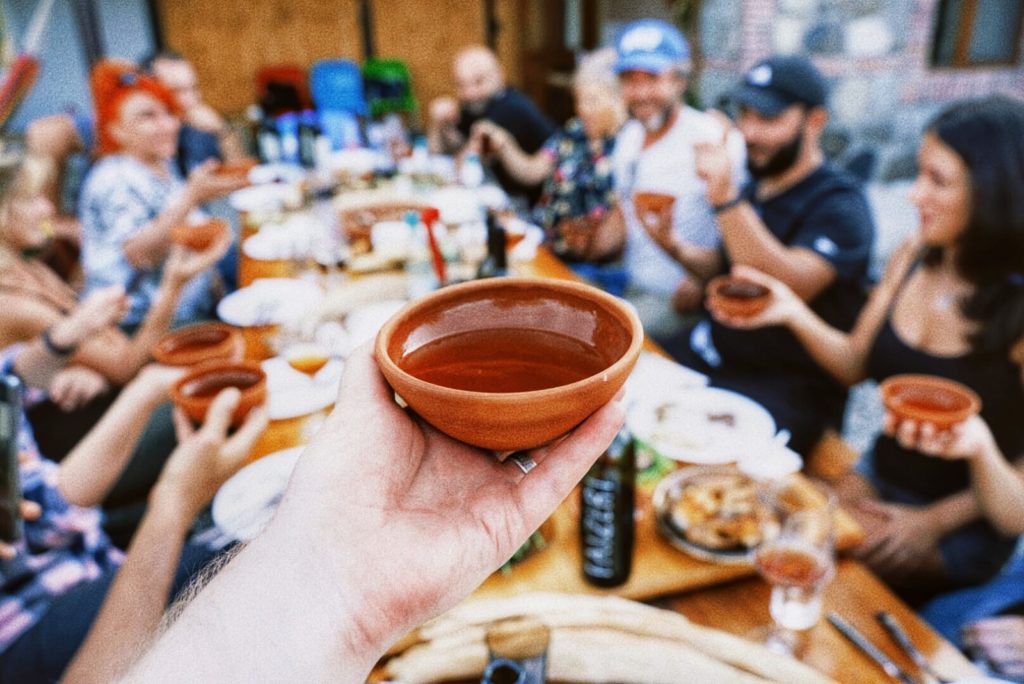
Supra, drinking from the pialia
You don’t have to attend Rtveli to attend a supra. Some of our tours feature a shortened version of this traditional Georgian dining extravaganza. A full supra can last for many hours, and it is common to consume 3+ liters of wine per person, as every toast (of which there are many!) can be accompanied by finishing your whole glass of wine, and then refilling.
We certainly don’t put pressure on our guests to over indulge in wine, as we prefer quality over quantity, but the option can be there for the serious drinker.
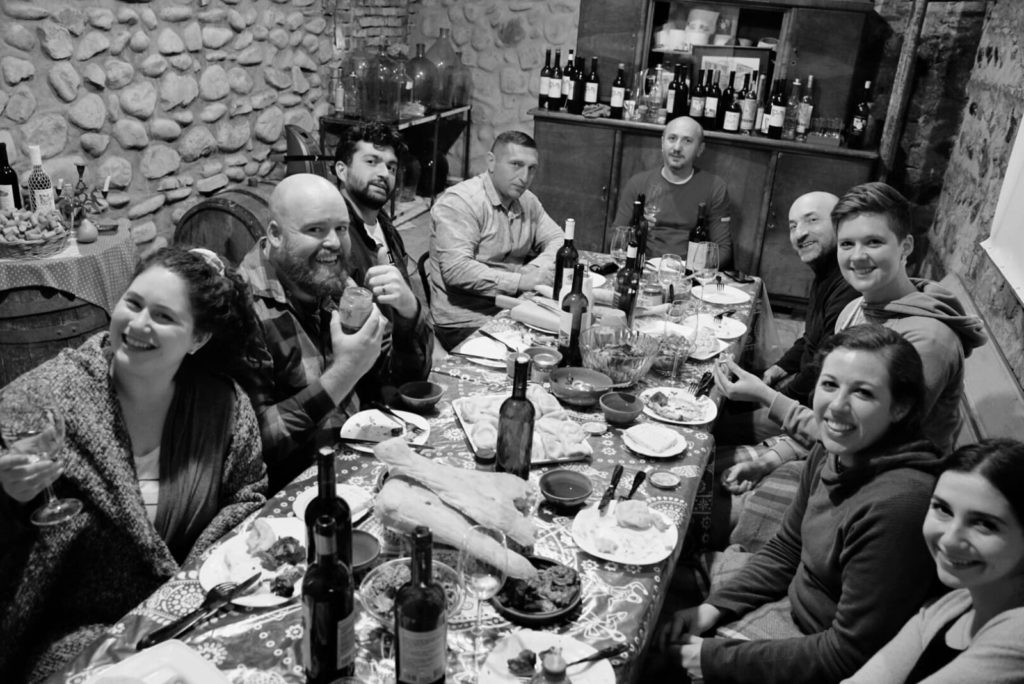
Small supra in a home marani with family and tour guests
Dishes will arrive en masse, and the feast will begin with the tamada (toastmaster) leading the toasts. The tamada manages the evening and the mood of the room, you will laugh, you will most likely cry as well, as a full range of emotions and memories are brought to life. From peace, to departed loved ones, those who cooked the food, family, children, wine, love, Georgia, guests, and many more topics are given a place for celebration and contemplation at the table.
The Rtveli supra is the final part of the whole cycle of Rtveli.
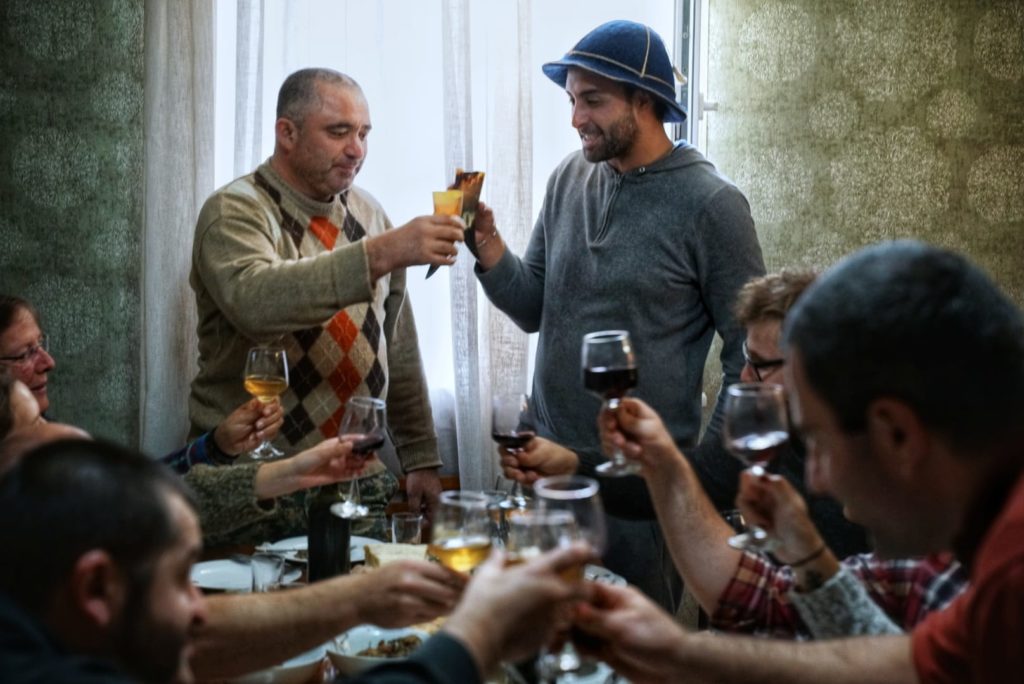
Toasts of the tamada, toasting with the kvantsi (drinking horn)
Following this, our drivers (who will not be drinking!) will get you safely back to your accommodation.
Experience Rtveli. Take a Tour With Us.
Get on the waitlist for one of our limited Real Family Rtveli Tours.
Or see all our scheduled tour options here.
.
